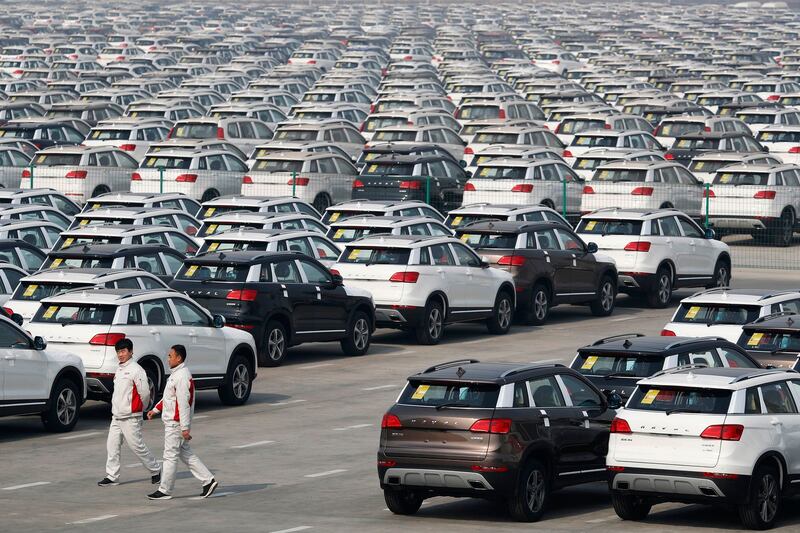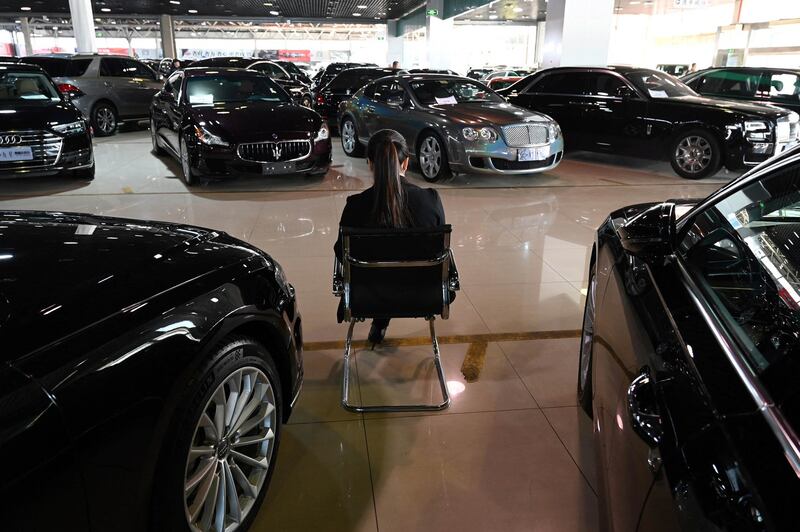Chinese automakers are selling off their stocks of vehicles -- many of them made with imported technology as part of joint ventures with top foreign brands -- at huge discounts ahead of a new set of emissions standards, Radio Free Asia has learned.
The price cuts kicked off at the beginning of the month with a round of steep discounts from state-owned Dongfeng Motor Group, which makes Citroens, in the central province of Hubei that was partly subsidized by the local government.
They come after ruling Chinese Communist Party leader Xi Jinping called for sweeping measures to stimulate consumer spending in a bid to revive the country's flagging economy.
The move has sparked a price war among other automakers affecting both conventionally powered and electric vehicles ahead of changes to carbon emissions standards that will take effect from July 1, people in the industry told Radio Free Asia.
A supplier for FAW-Volkswagen Automobile Co., Ltd. said the company, a joint venture between FAW Group and Volkswagen Group that makes Audi and Volkswagen cars for sale in China, had launched a 30% discount scheme on its Audi models, with price cuts of up to 35% on other models.
"The auto industry has seen a rapid expansion in capacity over the past 10 years, with inventory of millions of vehicles," the person said. "Now there are new rules on carbon emissions, so there's no other way [out of this]."
Discounts of up to 50% off
He said local governments are subsidizing the sell-off, with discounts of up to 50% on certain models from Dongfeng Citroen.
"For a 200,000 yuan car, the government will subsidize about 50,000 yuan, then the company will subsidize around 50,000 yuan," the person said. "Such discounts are unprecedented, and others are now following suit."

The person predicted that a number of joint venture automakers would collapse as a result, including Changan Ford, a 50/50 joint venture between local Changan Automobile and Ford Motor Company of the United States, especially as Changan's own-brand vehicles were outselling the China-made Ford models.
"Sales volumes of Changan's new energy vehicles and hybrids and their traditionally powered vehicles have been surpassing those of Ford vehicles across the board," the person said, adding that the Changan Ford and Dongfeng Citroen have been laying off staff in large numbers in recent months.
Another senior person in the automobile industry said there is no doubt that the joint venture vehicles are higher quality, but that the government is now throwing its weight behind new energy vehicles, which aren't as challenging to make.
"Why are they pushing electric vehicles? It's partly because of ecological factors, but also because there are certain technological barriers to their making diesel engines," the person said.
Chip shortage
He said Chinese automakers are currently scrambling to make up for the global shortage in chips for the auto industry, with some making overblown claims for their technology.
"There is a lot of fakery -- fraudulent attempts to compensate -- going on in the process, and that's a fact," he said.
An employee in charge of brand promotion at Changan Automobile declined to comment when contacted by Radio Free Asia, while requests to Dongfeng Motor also went unanswered.
Enquiries made at several departments of the China Automobile Association hadn't received any response by the time of publication.

Hubei's price-slashing campaign for Wuhan-based Dongfeng Motor Group sparked a slew of subsidies across the country, as local governments in Beijing, Tianjin, Shanghai, Zhejiang, Henan, Sichuan, Heilongjiang, Shanxi, Yunnan, Hainan and Guizhou followed suit with consumer subsidies to promote car ownership.
In the central province of Henan, the provincial government said it would subsidize new car purchases to the tune of 5%, while the northern port city of Tianjin has pledged to spend 60 million yuan on a similar scheme, while the eastern province of Shandong is offering a 200 million yuan voucher scheme for new car purchases.
To date, more than 30 auto brands have piled into the price war, with discounts of up to 70,000 yuan offered by Shanghai VW, subsidies of up to 37,000 yuan per vehicle from China FAW and combined corporate and government subsidies of up to 105,000 yuan being offered on Jining Dongfeng Peugeot models.
Guangqi Honda Haoying and Accords are being sold with discounts of up to 30,000 yuan, while Shanghai's SAIC is selling Audi A6L models with discounts of 90,000 yuan, with some Mercedes Benz models discounted to the tune of up to 120,000 yuan. Discounts of 40,000 yuan are currently being offered on all Ford electric models.
Financial commentator Si Ling said the move is a bid to stimulate consumption across the entire economy, a top priority for ruling Chinese Communist Party leader Xi Jinping as he begins a third term at the helm of a flagging economy in the wake of the hugely unpopular zero-COVID policy, which ended in December.
He said people are unlikely to start buying big ticket items like cars for the time being, however.
"The State Council has started laying people off, which shows that the Chinese government's coffers aren't as full as they once were," Si said. "A lot of people are thinking about the future, with imperfect coverage for sickness, schooling, pensions and so on."
"There are a lot of things to worry about, and a lot of people would rather save their money," he said.
Translated by Luisetta Mudie. Edited by Malcolm Foster.
